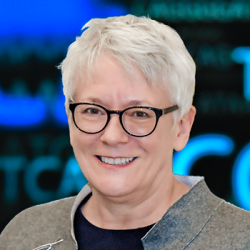Career and research
Christine Patch began her career as a nurse, eventually becoming a Consultant Genetic Counsellor and Manager at Guy's and St Thomas NHS Foundation Trust, where she led and developed the clinical genetics service at Guy's Hospital. She was also a Reader in the Florence Nightingale Faculty of Nursing and Midwifery at King's College London. [2]
As the Clinical Lead for Genetic Counselling at Genomics England, Patch is responsible for considering how resources are used to support patients and families who have received a genetic diagnosis from the 100,000 Genomes Project manage the impact of genetic information on their lives. [3] Patch is also the Caldicott guardian for Genomics England, ensuring that appropriate governance relating to confidentiality and data sharing for genomic healthcare and research in the NHS, is in place. [4] She is a member of Wellcome Connecting Science's Society and Ethics Research group, which is led by Professor Anna Middleton. [5]
Patch is also the Co-Lead of the Steering Group for the Global Genomics Nursing Alliance. [6]
She has extensive research interests in genetic testing, communication and counselling, investigating how the responsible uses of new technologies can deliver effective, patient and family-focused, health services. Recent work has included exploring the attitudes of young people to DNA sequencing, rare disease diagnosis and decision making; and assessing the views of healthcare professionals with experience of offering genome sequencing via the 100,000 Genomes Project. [7] [8]
Honours and awards
Patch was the Chair of the British Society for Genetic Medicine (2009-2011); [9] and the President of European Society of Human Genetics (2017-2018), [10] and remains an ESHG Board member. [11] She is also a Trustee of the Progress Educational Trust. [12]
This page is based on this
Wikipedia article Text is available under the
CC BY-SA 4.0 license; additional terms may apply.
Images, videos and audio are available under their respective licenses.
